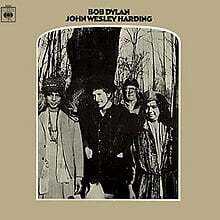PLEASE CLICK ‘WATCH ON YOU TUBE’ TO LIKE AND SUBSCRIBE!!!
EXTRACTS: THREE SONGS FROM BOB DYLAN’S ‘JOHN WESLEY HARDING’
Dear Landlord is a beautifully expressive ballad featuring a very committed and soulful vocal from Dylan, who leads the recording on piano. The narrator sings with the voice of bitter experience, apparently leaving much ‘unsaid’. We can only wonder what has brought him to this point but it is certainly true that the tone of the song can be described as ‘sober’. Dylan’s narrator begins with a striking – and perhaps somewhat fearful – plea: …Dear landlord, please don’t put a price on my soul… Then he tells us that …My burden is heavy/ My dreams are beyond control… There is a definite suggestion of spiritual dissatisfaction here, as if the narrator is caught in a tussle with his own conscience. He appears to be pleading for salvation but admits that, because of his ‘uncontrollable dreams’, this will be particularly difficult to achieve. The reference to a ‘burden’ seems to mirror the fate of Christian, the protagonist of Pilgrim’s Progress, who tries throughout the book to rid himself of the burden of sin. In Confessions (Book 10, Chapter 30) St. Augustine, who confesses to having led a rather hedonistic and sinful life when he was younger, writes about the difficulties of leading a moral life when his dreams lead him back towards his old ways. Having stepped off the ‘rock and roll treadmill’, with all its temptations and distractions, Dylan is trying to live such a life. But he fears that, having given into such enticements before, he will inevitably fall back into his old behaviour.

JOHN WESLEY HARDING …THE STEAMBOAT
The rather weird diction of: …When that steamboat whistle blows/ I’m going to give you all I have to give/ And I do hope you receive it well/ Depending on the way you feel that you live… necessitates some complex piano figures as Dylan squeezes the words in. This adds a further level of uncertainty to the narrator’s anxious protestations. Jacob Abbot, in his 1832 work Young Christian, describes the building and operation of a steamboat as a metaphor for life and death. In country pioneer Roy Acuff’s song Steamboat Whistle Blues (1935) the narrator laments not being able to hear the familiar Mississippi steamboat whistles as he is incarcerated in jail. This steamboat could be interpreted as the ‘whistle’ that blows at the end of life or the ‘whistle’ that sets the ‘ship of life’ in motion. The humble admonition of the last two tongue twisting lines appears to be begging the ‘landlord’ for approval.

The deeply reflective I Dreamed I Saw St. Augustine presents a considerable contrast. Whereas Dear Landlord expresses defiance and a determination to continue to struggle, here the narrator experiences a terrifying vision of spiritual desolation which cannot be overturned. Yet the raw terror of the song is restrained by its warm and expansive melody, which is derived from the early twentieth century protest ballad Joe Hill, a song about a victimised union leader who is executed by the US authorities for stirring up workers in revolt. Joan Baez performed this song at the Woodstock Festival in 1969. It is perhaps ironic that Dylan chose to frame this mysterious song around a protest ballad about a martyred figure when he himself had written songs about Hattie Carroll, Emmett Till, John Brown and Hollis Brown; all in their way ‘martyrs’, whether eal or fictional. The first line of Dylan’s song: …I dreamed I saw St. Augustine, alive as you or me… is almost identical to the first line of Joe Hill: …I dreamed I saw Joe Hill last night, alive as you or me…

JOHN WESLEY HARDING: THE DREAM
In the narrator’s dream he pictures Augustine in a state of spiritual confusion which has spilled over into outright panic. The saint is glimpsed …tearing through these quarters in the utmost misery… The archaic-sounding ‘tearing through’ suggests that Augustine is not only going too quickly but is destroying everything in his path, while the use of the equally old fashioned ‘quarters’ to indicate a living space places the whole scene in some mythical scenario in the distant past. Again Dylan is mining the King James Bible. Exodus 13:7, when outlining the rules about what is kosher, states that:
…Unleavened bread shall be eaten seven days; and there shall no leavened bread be seen with thee, neither shall there be leaven seen with thee in all thy quarters…
In the narrator’s vision St. Augustine is said to have …a blanket underneath his arm and a coat of solid gold… and to be …searching for the very souls whom already have been sold… He appears to be engaged in an utterly futile task in his battle with the Devil, who has already claimed the souls he was trying to save. The strange (and perhaps impossible) image of ‘a coat of solid gold’ seems to suggest that he is, like the coat, impermeable to outside influences. The ‘blanket underneath his arm’ may imply that he is planning to engage on a journey in search of those ‘lost souls’. Dylan is not depicting Augustine as a figure whose faith sustains him but one who is caught up in utter confusion. The narrator’s dream may well be a mirror of the state of his own soul, focusing on Augustine’s failed attempts to bring salvation.
LINKS….
STILL ON THE ROAD – ALL DYLAN’S GIGS
THE CAMBRIDGE BOB DYLAN SOCIETY




Leave a Reply